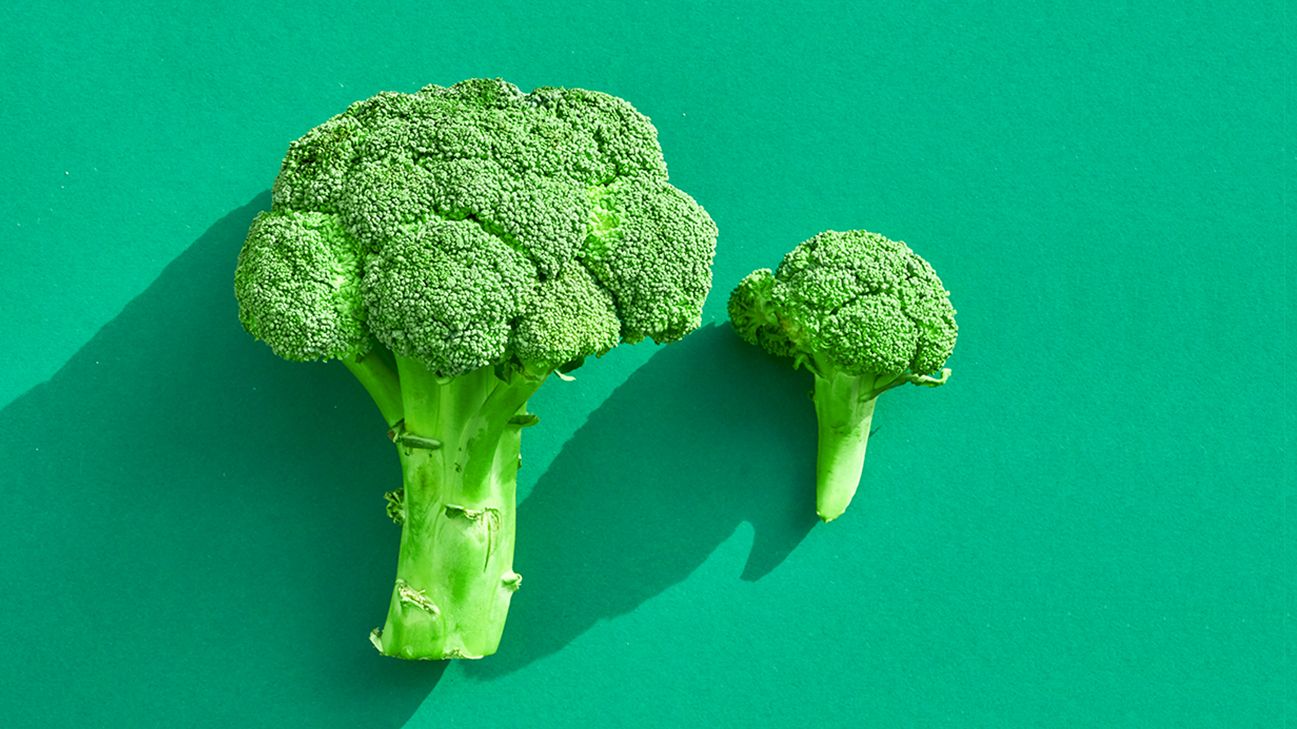Love or hate this crunchy cruciferous crudité (say that 17 times fast), it’s packed with antioxidants, has potential cancer-preventing properties, is pretty damn good for your heart, and promotes good digestive health.
Recipewise, it’s pretty versatile too — so even if it’s not your fave food on the planet, you’re bound to find some way to enjoy it.
After all, you can eat broccoli raw, sautéed, steamed, and roasted. You can mince it, chop it, and dice it. When cooking it, garlic and some olive oil are a simple but guaranteed way to add a burst of flavor. And when in doubt, add some cheese.
Still not convinced? Check out the six top benefits of eating more broccoli.

A common serving size of broccoli is 1 cup raw. You can cook it, of course, but its nutrition profile will change based on how you cook it. (FYI: Maybe avoid boiling to keep the nutrient loss to a minimum.)
So, here’s what you can expect for nutrition in a 1-cup serving of raw broccoli:
| Calories | 30 |
| Protein | 1.95 grams (g) |
| Fat | 0.258 g |
| Carbohydrates | 4.76 g |
| Fiber | 1.82 g |
| Sodium | 27.4 milligrams (mg) |
| Folate | 49.4 micrograms (µg) |
| Potassium | 230 mg |
| Vitamin C | 69.4 mg |
| Vitamin A | 6.08 µg |
| Vitamin B6 (pyridoxine) | 0.145 mg |
Fruits and veggies have long been touted as key components of a balanced eating plan. Consuming these foods is especially vital for heart health, particularly for reducing your risk of cardiovascular disease (CVD). And, given that heart disease is the No. 1 cause of death in the United States, finding any way to lower your CVD risk is a good idea.
Anyway, cue broccoli (the vegetable, not the incredibly catchy DRAM song that has lived rent-free in our heads since around 2016).
A 2018 review of studies suggests that cruciferous vegetables likely have strong cardiovascular health benefits. This category of vegetables includes the likes of collard greens, brussels sprouts, cauliflower, and (you guessed it) broccoli.
Some research has pointed to broccoli and other cruciferous veggies as potentially preventive for certain cancers, particularly due to their sulforaphane content.
Of course, the research is still inconclusive and ongoing, but the relationship is worth considering — and, frankly, eating more broccoli can’t hurt. So load up those plates.
Broccoli may be helpful to your gut too. In a 2017 study, mice who ate a diet supplemented with broccoli experienced beneficial effects for the gut microbiome (the bacteria living in the intestines), which led to decreases in inflammation.
The researchers noted that other veggies, like brussels sprouts and cauliflower, may have similar gut health benefits. It’s time to get that multi-veggie roast going.
These findings may be promising for those who deal with inflammatory bowel disease, a set of digestive disorders marked by chronic inflammation in the digestive tract.
One cup of raw broccoli contains 69.4 mg of vitamin C, which makes a huge dent in the recommended daily vitamin C intake of 75 mg for women and 90 mg for men. Vitamin C is also well known as a skin care all-star and, lest we forget, the soundtrack to everyone’s high school graduation videos. But we digress.
Vitamin C can make a big difference when it’s applied topically to your skin, but eating it can also be great for your skin (and for your bod overall). This is because vitamin C has antioxidant properties, meaning it can help prevent damage caused by free radicals, which have been linked to premature skin aging. Which brings us to our next point…
If you didn’t know, free radicals are molecules that are highly unstable (same) and have unpaired electrons. They easily attach to other molecules, and when they do, they can disrupt cellular processes, causing damage.
It’s important to keep in mind that free radicals are natural byproducts of metabolic processes, as well as external factors like cigarette smoke, and you can’t totally eliminate them (nor should that be your goal, but that’s another conversation).
The issues with free radicals arise when they cause oxidative stress, an imbalance between free radicals and antioxidants. The solution? More antioxidants, which you can get from your diet.
In addition to vitamin C, broccoli contains other antioxidants, including lutein and zeaxanthin, both of which are great for eye health.
How to bring broccoli into your life
- 19 recipes that prove broccoli rice is the next best thing for low-carb lovers
- 12 broccoli recipes that prove it’s way more than a boring side dish
- One-pot beef and broccoli stir-fry
- Broccoli cheddar frittata
- Quinoa with broccoli-avocado pesto
- 16 high-fiber foods and recipes that’ll make you want to eat them
- Mini broccoli polenta cakes
- 40 ways to sneak veggies into any meal without sacrificing flavor
- Keto Chinese food: The top 17 menu items
- Easy Paleo dinners to make in 10 minutes or less

